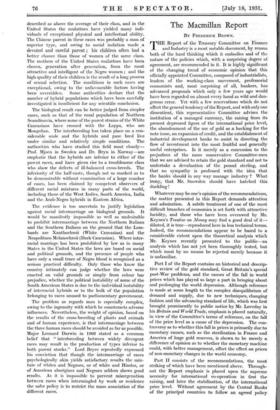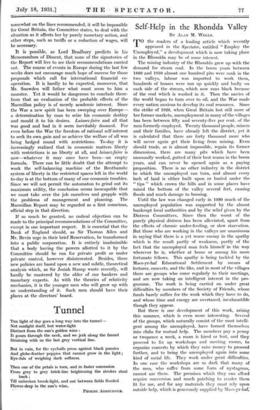The Macmillan Report
BY FREDERICK BROWN.
THE Report of the Treasury Committee on Finance and Industry is a most notable document, by reason both of the hard thinking which it embodies and of the nature of the policies which, with a surprising degree of agreement, are recommended in it. It is highly significant of the changing trend of economic opinion that this officially appointed Committee, composed of industrialists, leaders of the working-class movement, professorial economists and, most surprising of all, bankers, has advanced proposals which only a few years ago would have been regarded on almost every hand as wild and dan- gerous error. Yet with a few reservations which do not affect the general tendency of the Report, and with only one dissentient, this representative Committee advises the institution of a managed currency, the raising from its present depressed figure of the international price level, the abandonment of the use of gold as a backing for the note issue, an expansion of credit, and the establishment of industrial development banks to assist in directing the flow of investment into the most fruitful and generally useful enterprises. Is it merely as a concession to the prejudices of the more conservative Committee-men that we are advised to retain the gold standard and not to undertake a devaluation of the pound sterling, and that no sympathy is professed with the idea that the banks should in any way manage industry ? What irony, that Mr. Snowden should have hatched this duckling !
Whatever may be one's opinion of the recommendations, the matter presented in this Report demands attention and admiration. A subtle treatment of one of the most difficult branches of economics is set forth with attractive lucidity, and those who have been overawed by Mr. Keynes's Treatise on Money may find a good deal of it— diluted, it is true—reproduced here in less technical terms. Indeed, the recommendations appear to be based to a considerable extent upon the theoretical analysis which Mr. Keynes recently presented to the public—an analysis which has not yet been thoroughly tested, but which must by no means be rejected merely because it is unfamiliar.
Part I of the Report contains an historical and descrip- tive review of the gold standard, Great Britain's special post-War problems, and the causes of the fall in world prices which has played so large a part in bringing about and prolonging the world depression. Although reference is made at some length to the complex disequilibrium of demand and supply, due to new techniques, changing fashion and the advancing standard of life, which was first brought prominently to public notice by Mr. Loveday in his Britain and World Trade, emphasis is placed naturally, in view of the Committee's terms of reference, on the fall of the price level as a cause of the depression. The con- troversy as to whether this fall in prices is primarily .due to monetary causes, such as the sterilization in France and America of huge gold reserves, is shown to be merely a difference of opinion as to whether the monetary machine could, with better management, offset the effect on prices of non-monetary changes in the world economy.
Part II consists of the recommendations, the most striking of which have been mentioned above. Through- out the Report emphasis is placed upon the supreme necessity for international co-operation in first the raising, and later the stabilization, of the international price level. Without agreement by the Central Banks of the principal countries to follow an agreed policy somewhat on the lines recommended, it will be impossible for Great Britain, the Committee states, to deal with the situation as it affects her by purely monetary action, and other steps, such as tariffs or a reduction of wages, will be necessary.
It is possible, as Lord Bradbury predicts in his Memorandum of Dissent, that none of the signatories of the Report will live to see their recommendations carried out. The course of events in Europe during the last few weeks does not encourage much hope of success for those proposals which call for international financial co- operation. It is hardly to be expected, moreover, that Mr. Snowden will father what must seem to him a monster. Yet it would be dangerous to conclude there- from that an evaluation of the probable effects of the Macmillan policy is of merely academic interest. Since the War a new spirit has been sweeping over Europe--- a determination by man to seize his economic destiny and mould it. to his desires. Laissez-faire and all that was good and bad in it seem inevitably doomed. For even before the War the freedom of rational self-interest to seek its own gain and so achieve the welfare of all was being hedged round with restrictions. To-day it is increasingly realized that in economic matters liberty with restrictions is no liberty at all, and laissez-faire is now—whatever it may once have been—an empty formula. There can be little doubt that the attempt to work the self-balancing machine of the Benthamite system of liberty in the restricted spaces left in the world to-day is at the bottom of many of our economic troubles. Since we will not permit the automaton to grind out its maximum utility, the conclusion seems inescapable that we must take over the job ourselves and grapple with the problems of management and planning. The Macmillan Report may be regarded as a first conscious, official step in that direction.
If so much be granted, no radical objection can be made to the principal recommendations of the Committee, except in one important respect. It is essential that the Bank of England should, as Sir Thomas Allen and Mr. Bevin urge in their brief Reservation, be transformed into a public corporation. It is entirely inadmissible that a body having the powers allotted to it by the Committee should be run for private profit or under private control, however disinterested. Besides, these new policies are based upon a new and subtle, theoretical analysis which, as Sir Josiah Stamp wrote recently, will hardly be mastered by the older of our bankers and monetary experts. As with the theories of relativity mechanics, it is the younger men who will grow up with an understanding of it. Such men should have their places at the directors' board.



































 Previous page
Previous page